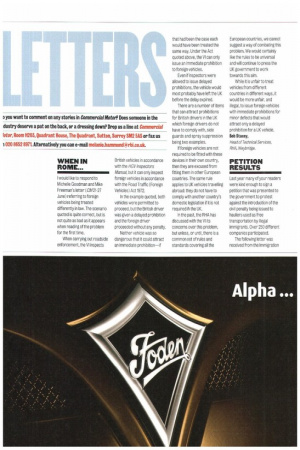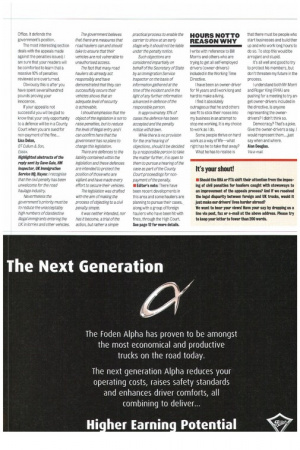o you want to comment on any stories in Commercial
Page 26

Page 27

If you've noticed an error in this article please click here to report it so we can fix it.
Moto& Does someone in the Iduslry deserve a pat on the back, or a dressing down? Drop us a line at Commercial later, Room H205, Quadrant House, The Quadrant, Sutton, Surrey 5M2 5AS or fax us 1 020 8652 8971. Alternatively you can e-mail melanie.hammond@rbi.co.uk.
WHEN IN ROME...
I would like to respond to Michelle,Goodman and Mike Freeman's letter (CM21-27 June) referring to foreign vehicles being treated differently in law. The scenario quoted is quite correct, but is not quite as bad as it appears when reading of the problem for the first time.
When carrying out roadside enforcement, the VI inspects
British vehicles in accordance with the I-16V Inspectors Manual, but it can only inspect foreign vehicles in accordance with the Road Traffic (Foreign Vehicles) Act 1972,
In the example quoted, both vehicles were permitted to proceed, but the British driver was given a delayed prohibition and the foreign driver proceeded without any penalty.
Neither vehicle was so dangerous that it could attract an immediate prohibition—if that had been the case each would have been treated the same way. Under the Act quoted above, the VI can only issue an immediate prohibition to foreign vehicles.
Even if inspectors were allowed to issue delayed prohibitions, the vehicle would most probably have left the UK before the delay expired.
There are a number of items that can attract prohibitions for British drivers in the UK which foreign drivers do not have to comply with, side guards and spray suppression being two examples.
If foreign vehicles are not required to be fitted with these devices in their own country, then they are excused from fitting theme other European countries. The same rule applies to UK vehicles travelling abroad: they do not have to comply with another country's domestic legislation if it is not required ih the UK.
In the past, the RHA has discussed with the VI its concerns over this problem, but unless, or until, there is a common set of rules and standards covering all the European countries, we cannot suggest a way of combating this problem. We would certainly Ike the rules to be universal and will continue to press the UK government to work towards this aim.
While it is unfair to treat vehicles from different countries in different ways, it would be more unfair, and illegal, to issue foreign vehicles with immediate prohibitions for minor defects that would attract only a delayed prohibition for a UK vehicle. Bob Stacey,
Head of Technical Services, R1--/A Weybridge.
PETITION RESULTS
=II■1I■1
Last year many of your readers were kind enough to sign a petition that was presented to the government to protest against the introduction of the civil penalty being issued to hauliers used as free transportation by illegal immigrants. Over 250 different companies participated.
The following letter was received from the Immigration Office. It defends the government's position.
The most interesting section deals with the appeals made against the penalties issued; I am sure that your readers will be comforted to learn that a massive 10% of penalties reviewed are overturned.
Obviously this is after you have spent several hundred pounds proving your innocence.
If your appeal is not successful you will be glad to know that your only opportunity to a defence will be in a County Court when you are sued for non-payment of the fine... Lisa Dolan, BT Cullum & Son, Essex.
Highlighted abstracts of the reply sent by Dave Cale, HM inspector, UK Immigration Service HD, Hayes irecognise that the civil penalty has been unwelcome for the road haulage industry.
Nevertheless the government's priority must be to reduce the unacceptably high numbers of clandestine illegal immigrants entering the UK in lorries and other vehicles, The government believes that there are measures that road hauliers can and should take to ensure that their vehicles are not vulnerable to unauthorised access.
The fact that many road hauliers do already act responsibly and have demonstrated that they can successfully secure their vehicles shows that an adequate level of security is achievable.
(should emphasise that the object of the legislation is not to raise penalties, but to reduce the level of illegal entry and I can confirm here that the government has no plans to change this legislation.
There are defences to the liability contained within the legislation and these defences are intended to protect the position of those who are vigilant and have made every effort to secure their vehicles.
The legislation was drafted with the aim of making the process of objecting to a civil penalty simple.
It was neither intended, nor has it become, a trial of the action, but rather a simple practical process to enable the carrier to show at an early stage why it should not be liable under the penalty notice.
Such objections are considered impartially on behalf of the Secretary of State by an immigration Service inspector on the basis of information gathered at the time of the Incident and in the fight of any further information advanced in defence of the responsible person.
In approximately V% of cases the defence has been accepted and the penalty notice withdrawn.
While there is no provision for the oral hearing of objections, should it be decided by a responsible person to take the matter further, it is open to them to pursue a hearing of the case as part of the County Court proceedings for nonpayment of the penalty.
• Editor's note: There have been recent developments in this area and some hauliers are planning to pursue their cases, along with a group of foreign hauliers who have been hit with fines, through the High Court. See page 12 for more details.
HOURS NOT TO REASON WHY
I write with reference to Bill Morris and others who are trying to get all self-employed drivers (owner-drivers) included in the Working Time Directive.
I have been an owner-driver for 14 years and I work long and hard to make a living.
I find it absolutely outrageous that he and others see ft to stick their noses into my business in an attempt to stop me working. It is my choice to work as I do.
Some people thrive on hard work as a way of life—what right has he to take that away?
What he has to realise is that there must be people who start businesses and build ther up and who work long hours to do so. To stop this would be arrogant and stupid.
Its all well and good to try to protect his members, but don't threaten my future in the process.
I understand both Mr Morni and Roger King (RHA) are pushing for a meeting to try an get owner-drivers included in the directive. Is anyone representing the ownerdrivers?1 didn't think so.
Democracy? That's a joke. Give the owner-drivers a say. I would represent them...just say when and where.
Alan Douglas.
Via e-mail.








































































































